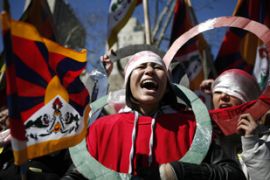Tibet surrender deadline passes
China-installed governor warns of “harsh” treatment for protesters refusing to give up.

The Chinese government has so far taken a more open strategy than in the past, allowing state television to run pictures out of the Tibetan capital, Lhasa.
International reaction
While Russia has come out to firmly back China’s handling of the affair, protests from Tibet sympathisers continue around the world with clashes reported outside Chinese diplomatic posts in New York, Washington, Paris, Munich and other cities in recent days.
| In depth | |
|
In an unusual news conference at midnight on Monday, the Chinese foreign ministry accused Tibetan activists of launching attacks on its embassies around the world and vowed to protect its territory.
After some initial reluctance, the international community is starting to weigh in on the issue.
Ban Ki-moon, the UN secretary-general, said on Monday that he was “increasingly concerned about the tensions and reports of violence and loss of life in Tibet”.
“At this time I urge restraint on the part of the authorities and call on all concerned to avoid further confrontation and violence,” he said.
Condoleezza Rice, the US secretary of state, again called on China to exercise restraint and “engage the Dalai Lama”, the exiled Tibetan spiritual leader.
Following reports of deaths, the Dalai Lama called for an international inquiry into what he said was China‘s “rule of terror” and “cultural genocide” in Tibet.
The European Union also repeated its call for “restraint on all sides”.
Olympics worry
China has not admitted it publicly, but it is clear the big worry is whether the Tibet issue will cast a shadow over Beijing’s hosting of the Olympics in just five months.
| Your Views |
|
Could the Tibetan protests derail China’s plans for a smooth run-up to the Beijing Olympics? |
Originally providing a non-committal response, the head of the International Olympic Committee (IOC) is now saying he is “very concerned” about the situation in Tibet and the neighbouring provinces.
But Jacques Rogge rejected the idea of a boycott.
EU nations and Olympic committees have also opposed a boycott, arguing that sports and politics should not be linked.
Patrick Hickey, the head of the European Olympic committees, said “not one government leader has called for a boycott”.
“Under no circumstance will we support the boycott. We are 100 per cent unanimous,” he said, adding that “a boycott is only a punishment of the athletes”.
The US Olympic committee said a boycott was the “worst idea ever conceived”.
“Other than unnecessarily and unfairly punishing athletes, Olympic boycotts accomplish absolutely nothing,” it said.
However, the Swiss Olympic committee, which also ruled out a boycott, urged the IOC to “remind China of the expectations that were linked to granting it the Games”.
The Chinese organisers of the Olympics have said the Tibetan unrest will not have an impact on the games.
Sun Weide, a spokesman for the Beijing Organising Committee of the Olympic Games, said preparations for the torch relay across Mount Everest and Tibet “have been proceeding very smoothly and according to schedule”.
‘Massive restraint’
Puncog, Tibet’s governor, said Chinese security forces had exercised “massive restraint” in quelling riots in Lhasa, which is the centre of Tibetan Buddhism.
| Tibet key dates |
|
1959 Dalai Lama flees to exile in India after failed uprising against Chinese rule 1960s-70s Hundreds of monasteries destroyed during Chinese Cultural Revolution 1965 China announces creation of Tibet Autonomous Region 1989 Dalai Lama awarded Nobel Peace Prize for leading non-violent struggle for Tibet 2006 Opening of first rail line linking Tibet to rest of China |
The ethnic Tibetan installed as governor by the Communist government in Beijing said he would be lenient with protesters who had committed crimes but showed remorse.
“We have been dealing with the incident in accordance with the law,” he told a news conference in Beijing on Monday.
“China is a country ruled by law. No country would allow this violence.”
He said dozens of people were wounded in the violence in which “people were hacked and burned to death”, but he denied that lethal force had been used against protesters.
“Security forces used great restraint and did not carry or use weapons,” he said.
A heavy security presence was maintained in Tibet throughout Monday.
Troops were also pouring into neighbouring provinces of Gansu and Sichuan to put down protests which have spread to Tibetan communities there.
The AFP news agency said that at least seven Tibetan protesters had been shot dead in Sichuan on Sunday during clashes with police.
Over the weekend large deployments of troops had been used to quell the Lhasa protests, which began on the anniversary of a 1959 uprising against Chinese rule of the region.
China has also clamped down on the media, banning foreign reporters from Tibet and blocking access to YouTube, as well as many other overseas news websites.

